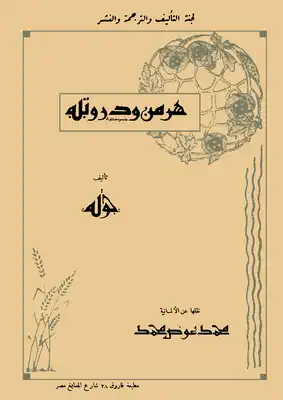Newly released
This book is new and will be uploaded as soon as it becomes available to us and if we secure the necessary publishing rights.

هرمن ودورتيه
(0)
Author:
Johann Wolfgang GoetheNumber Of Reads:
160
Language:
Arabic
Category:
literatureSection:
Pages:
213
Quality:
good
Views:
1170
Quate
Review
Save
Share
Book Description
هذا الكتاب الذى بين أيدينا ستجد فيه براعة في تصوير أشخاص القصة بما لهم من حياة وشعور وذكاء وخلق ، مما تجد عند الألمان ومن صفات أخرى تجدها في الناس جميعاً ، بما تجرى به ألسنتهم من حديث ساذج ولكنه خصب كأخصب ما يكون الحديث . فيه تصوير لحياة الطبقات الوسطى في المدن وفيه تجلية لهذه الحكمة الرائعة التى تسيطر على حياة الناس مهما تختلف الأجيال والازمان ، وستجد هذه البراعة في هذا التصوير الخفيف الأخاذ للطبيعة الحية في المدينة ومن حولها في غير تكلف ولا بحث ظاهر ولا استقصاء للألفاظ الخلابة . نعم وستجد هنا البراعة بنوع خاص إن كنت قد قرأت الألياذة والأودساحين تحس التشابة بين هذين النوعين من الشعر في الوزن اولا وليس هذا بالشىء الذى يعنينا وفي الأسلوب والسذاجة بعد ذلك ، وهو الشىء الذي يجب أن نقف عنده ونلتفت فيه . استمتع بقراءة وتحميل ديوان هرمن ودورتيه للكاتب يوهان جوته.
Johann Wolfgang Goethe
Goethe: A famous German writer, novelist, storyteller and poet, who has made a great contribution to world literature, especially German. Johann Wolfgang Goethe was born in March 1749 in the city of Frankfurt on the River Main, to a firm, well-off father, who obliged him to learn Latin, Italian, Greek, Hebrew, French, English, some music and painting, in addition to some natural sciences, such as the University of Physics, who sent him to the University of Physics. However, he inclined to the study of literature and began writing poems and dramatic plays, and besides literature he was interested in natural history and medicine. In 1768, Goethe returned to Frankfurt, and his father became angry with him and sent him to the University of Strasbourg, where he obtained a law degree, in which he followed the famous German writer Herder. The Supreme Court, followed the senior judges and got acquainted with some of the men of power. In 1774, Goethe became acquainted with Duke Karl August, governor of the province of Weimar, and this friendship strengthened until the Duke gave him one of the most prestigious positions in the province, in addition to appointing him a member of the Supreme Council of the province, and deducted a salary and a house for him. Goethe traveled to Italy in 1786 and stayed there for about a year and a half. He himself considered this trip a turning point in his life. Where his personality was influenced by Italian art and literature, in which he wrote the plays "Iphigenia", "Egmont" and "Tasso". Goethe was influenced by Arabic literature since his youth; At the age of twenty-three he composed a poem in praise of the Prophet “Muhammad”, and his relationship with Eastern, Persian and Arabic literature was strengthened by him, especially after the age of sixty. Where he studied the poetry of "Hafez al-Shirazi" as a translator, and was acquainted with the customs and history of the East, with the help of some orientalists, because he was not fluent in Arabic. Goethe has many books, the most famous of which are: “The Sorrows of Werther”, “Faust”, “The Eastern Divan of the Western Author”, “Selected Genealogy”, “Tasso”, and “The Lover’s Caprice”. Goethe died at his home in Weimar in 1832.
Book Currently Unavailable
This book is currently unavailable for publication. We obtained it under a Creative Commons license, but the author or publisher has not granted permission to publish it.
Rate Now
5 Stars
4 Stars
3 Stars
2 Stars
1 Stars
Quotes
Top Rated
Latest
Quate
Be the first to leave a quote and earn 10 points
instead of 3
Comments
Be the first to leave a comment and earn 5 points
instead of 3